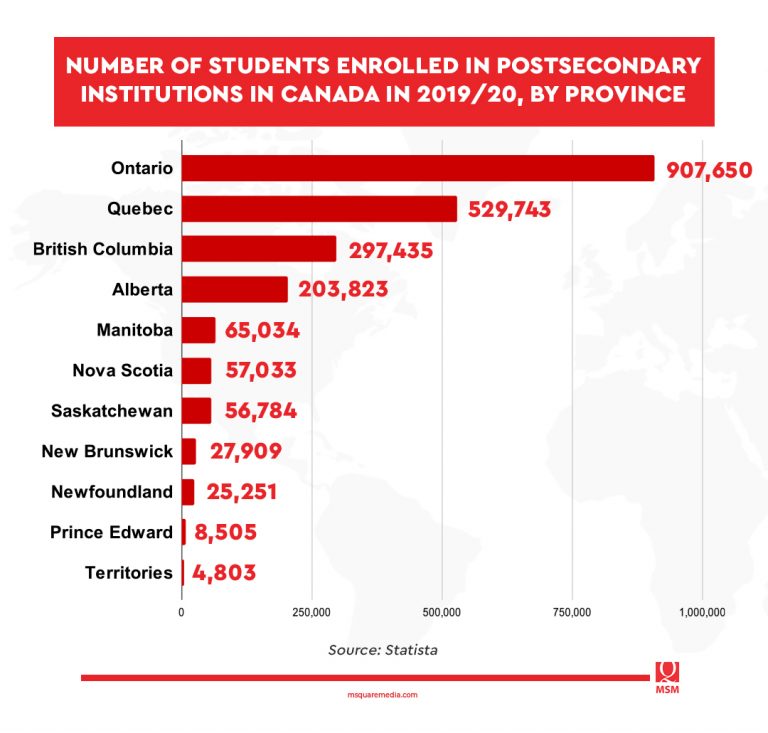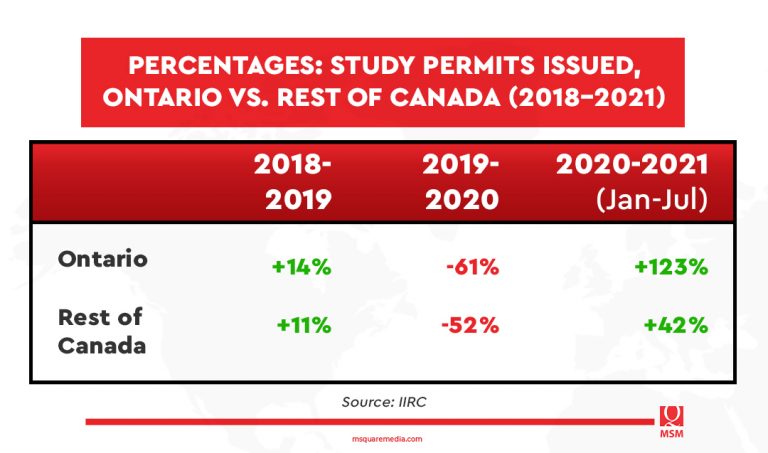Canada is one of the rising powerhouses in the international education sector. As to which of its provinces ranks as the top destination for international students, it’s Ontario—and leading by a wide margin.
- In 2019-2020, there were about 907,650 enrolled postsecondary education students in Ontario, Canada.
- Immigration, Refugees and Citizenship Canada approved 124,711 study permits for international students in 2019-2020.
- In 2020-2021, Ontario approved 123 percent more new study permits than in the previous year.
- The top source countries are India, China, the Philippines, Iran and Colombia.
According to data published in January 2022, there were a total of 907,650 students enrolled in higher education institutions in Ontario. This makes up approximately 42 percent of the total number of students—2,183,970—enrolled across 11 provinces across Canada.

When factoring in international students, Ontario achieved high international enrollments in 2019 when it issued 124,711 study permits to new students, according to Immigration, Refugees and Citizenship Canada (IRCC).
One could deduce an approximation from these data points. Of the total number of postsecondary education students in Ontario, approximately 14 percent are international students.
However, the pandemic negatively impacted the international education sector. Strictly looking at the numbers in terms of applications, 2020 numbers dropped (the COVID-19 pandemic was officially declared in March 2020) by approximately half.
Fortunately, new student permit applications have gone up since then, logging a 27 percent increase in August 2021 from the same period in 2019, according to the IRCC. Ontario continues to dominate, as 108,614 international students were approved to study in the province during the first half of 2021.
Based on approved student permits, Ontario’s numbers have been more bullish as compared to the rest of the country. For 2020-2021, Ontario approved 123 percent more new study permits than it did for 2019-2020. The rest of Canada? Only 42 percent more based on the same time period.

Levels, Emerging Markets
Compared to the other Canadian provinces, Ontario has the largest number of universities and post-secondary colleges.
Taking this advantage into consideration, it’s no wonder Ontario continues to be an attractive destination for international students. This is evidenced by the 178 percent more study permits for college issued in the first of 2021 compared to the entire year of 2020. By the time more figures are released by the IRCC, Ontario would’ve already hosted historical numbers in terms of international college and university students (domestic and international).
It is worth noting, however, that of the total number of new study permits for Ontario in 2021 (first half), 60 percent of it was for colleges and 22 percent was for universities. Compared to the rest of Canada, only 26 percent were for colleges and 49 percent for universities. These numbers are telling of Ontario’s strengths as a destination for students who prefer to engage in learning practical skills while taking on a much lighter financial responsibility post-graduation.
As for source countries of these students, the top five according to the study permits approved in 2021 (first half) were India (67,878), China (12,511), the Philippines (3,556), Iran (1,530) and Colombia (1,330).
The top five emerging markets identified in the last five years, according to the increase of approved study permits to Ontario (2016-2021), are the following: The Philippines (749 percent), Nepal (461 percent), Sri Lanka (229 percent), Bangladesh (225 percent) and Jordan (175 percent).
Conclusion
Ontario looks to even improve its international student intake in the coming years, and its higher education institutions need to stay competitive in its tuition rates, course offerings, and the strategic partnerships it makes in order to reach more students in the emerging markets.
Before the pandemic, it was estimated that international students contributed about $22 billion to Canada’s economy. Having them back is important if the country wants to rebound, and Ontario can lead the way. (SUNEETHA QURESHI)
Suneetha has more than 10 years of experience in the international education sector. As president of MSM GMO, she fortifies its business development outreach globally, particularly in the face of MSM’s foray in edtech-based recruitment via MSM Unify. She preserves the premium, value-adding services provided to each GMO partner institution, including dedicated teams on the ground, agent management, lead generation and inquiry management, application pre-screening, and student and parent support through pioneering pre-departure briefing sessions.
She has an impeccable track record of successfully launching the representative offices in Asia and Africa of many North American and European higher education institutions. Her key strengths include hiring, training, and developing teams as evidenced by the successful results of the dedicated in-country college and university client teams.
Suneetha also has taken the lead in developing several initiatives at MSM, including building robust standard operating procedures, the Rise ‘n Shine team engagement platform, and the organization’s data analytics and audit segments.
Sources
Number of students enrolled in postsecondary institutions in Canada in 2019/20, by province (2022, January 14) Statista. Retrieved from https://www.statista.com/statistics/447802/enrollment-of-postsecondary-students-in-canada-by-province/
Canadian immigration reports surge in study permit applications in 2021 (2021, October 20) ICEF Monitor. Retrieved from https://monitor.icef.com/2021/10/canadian-immigration-reports-surge-in-study-permit-applications-in-2021/#:~:text=IRCC%20reports%20more%20than%20730%2C000,January%20and%20May%20this%20year.
The Ontario Advantage. Columbia International College. Retrieved from https://www.cic-totalcare.com/discover-columbia-3/the-ontario-advantage/
The economic impact of COVID-19 on Canada’s international education sector in 2020 (2021, October 29). Government of Canada. Retrieved from https://www.international.gc.ca/education/report-rapport/covid19-impact/index.aspx?lang=eng

